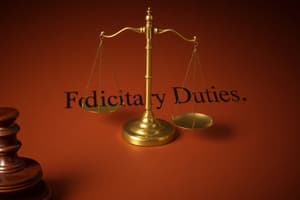Podcast
Questions and Answers
True or false: A fiduciary is someone who acts mainly for their own benefit?
True or false: A fiduciary is someone who acts mainly for their own benefit?
False (B)
True or false: A fiduciary has the responsibility to act in the best interest of another person or entity?
True or false: A fiduciary has the responsibility to act in the best interest of another person or entity?
True (A)
True or false: A fiduciary is not legally obligated to prioritize the interests of the person they are representing?
True or false: A fiduciary is not legally obligated to prioritize the interests of the person they are representing?
False (B)
True or false: A fiduciary is someone who acts solely for their own benefit?
True or false: A fiduciary is someone who acts solely for their own benefit?
True or false: A fiduciary must primarily act for the benefit of another person?
True or false: A fiduciary must primarily act for the benefit of another person?
True or false: A fiduciary can prioritize their own interests over those of the person they represent?
True or false: A fiduciary can prioritize their own interests over those of the person they represent?
Flashcards are hidden until you start studying
Study Notes
Fiduciary Relationships
- A fiduciary is NOT someone who acts mainly for their own benefit.
- A fiduciary has the responsibility to act in the best interest of another person or entity.
- A fiduciary IS legally obligated to prioritize the interests of the person they are representing.
- A fiduciary is NOT someone who acts solely for their own benefit.
- A fiduciary MUST primarily act for the benefit of another person.
- A fiduciary CANNOT prioritize their own interests over those of the person they represent.
Studying That Suits You
Use AI to generate personalized quizzes and flashcards to suit your learning preferences.




